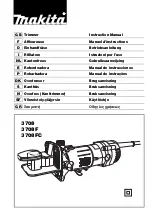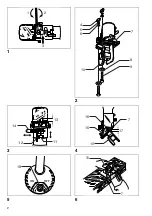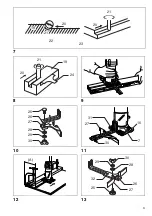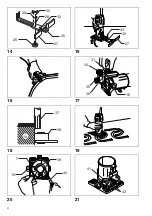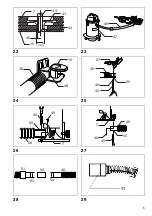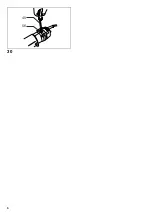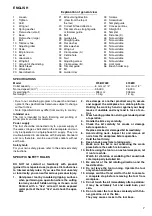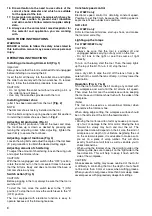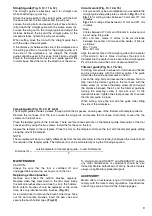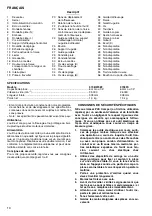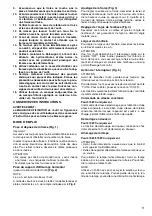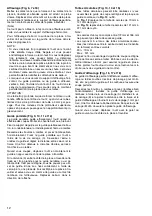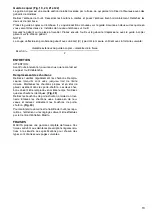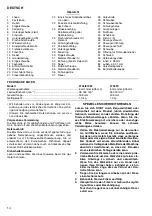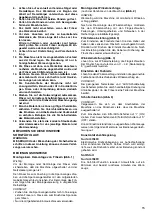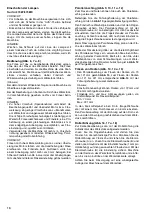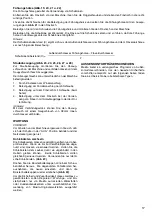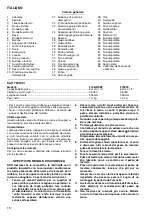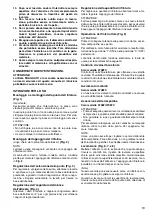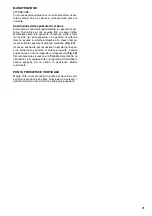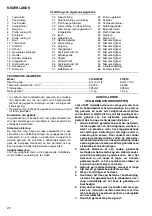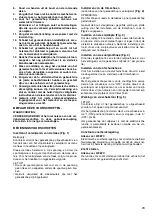
8
16. Draw attention to the need to use cutters of the
correct shank diameter and which are suitable
for the speed of the tool.
17. Some material contains chemicals which may be
toxic. Take caution to prevent dust inhalation
and skin contact. Follow material supplier safety
data.
18. Always use the correct dust mask/respirator for
the material and application you are working
with.
SAVE THESE INSTRUCTIONS.
WARNING:
MISUSE or failure to follow the safety rules stated in
this instruction manual may cause serious personal
injury.
OPERATING INSTRUCTIONS
Installing or removing trimmer bit (Fig. 1)
Important:
Always be sure that the tool is switched off and unplugged
before installing or removing the bit.
Insert the bit all the way into the collet cone and tighten
the collet nut securely with the two wrenches. To remove
the bit, follow the installation procedure in reverse.
CAUTION:
• Do not tighten the collet nut without inserting a bit, or
the collet cone will break.
• Use only the wrenches provided with the tool.
Installing trimmer shoe
(after it has been removed from the tool)
(Fig. 2)
NOTE:
The trimmer shoe is factory installed on the tool.
Use the bolts, wing nuts, spring washers and flat washers
to install the trimmer shoe as shown in
Fig. 2
.
Adjusting bit protrusion (Fig. 3)
To adjust the bit protrusion, loosen the lever and move
the tool base up or down as desired by pressing and
turning the adjusting roller. After adjusting, tighten the
lever firmly to secure the tool base.
Adjusting angle of tool base (Fig. 4)
Loosen the wing bolts and adjust the angle of the tool base
(5° per graduation) to obtain the desired cutting angle.
Adjusting amount of chamfering
To adjust the amount of chamfering, loosen the wing nuts
and adjust the trimmer shoe.
CAUTION:
With the tool unplugged and switch in the “OFF” position,
rotate the collet nut on the tool several times to be sure
that the bit turns freely and does not contact the base or
trimmer shoe in any way.
Switch action (Fig. 5)
CAUTION:
Before plugging in the tool, always be sure that the tool is
switched off.
To start the tool, move the switch lever to the “I” (ON)
position. To stop the tool, move the switch lever to the “0”
(OFF) position.
The tool equipped with electronic function is easy to
operate because of the following features.
Constant speed control
For 3708FC only
Electronic speed control for obtaining constant speed.
Possible to get fine finish, because the rotating speed is
kept constant even under load condition.
Soft start
For 3708FC only
Soft-start feature minimizes start-up shock, and makes
the tool start smoothly.
Lighting up the lamps
For 3708F/3708FC only
CAUTION:
• Always be sure that the tool is switched off and
unplugged before carrying out any work on the tool.
• Do not look in the light or see the source of light
directly.
To turn on the lamp, start the tool. Then, the lamp lights
up the top of the bit. To turn it off, stop the tool.
NOTE:
Use a dry cloth to wipe the dirt off the lens of lamp. Be
careful not to scratch the lens of lamp, or it may lower the
illumination.
Operation (Fig. 6, 7 & 8)
Turn the tool on without the bit making any contact with
the workpiece and wait until the bit attains full speed.
Then move the tool over the workpiece surface, keeping
the tool base and trimmer shoe flush with the sides of the
workpiece.
(Note)
This tool can be used as a conventional trimmer when
you remove the trimmer shoe.
When doing edge cutting, the workpiece surface should
be on the left side of the bit in the feed direction.
NOTE:
• Moving the tool forward too fast may cause a poor qual-
ity of cut, or damage to the bit or motor. Moving the tool
forward too slowly may burn and mar the cut. The
proper feed rate will depend on the bit size, the kind of
workpiece and depth of cut. Before beginning the cut
on the actual workpiece, it is advisable to make a sam-
ple cut on a piece of scrap lumber. This will show
exactly how the cut will look as well as enable you to
check dimensions.
• When using the trimmer shoe, the straight guide or the
trimmer guide, be sure to keep it on the right side in the
feed direction. This will help to keep it flush with the
side of the workpiece.
CAUTION:
Since excessive cutting may cause overload of the motor
or difficulty in controlling the tool, the depth of cut should
not be more than 3 mm at a pass when cutting grooves.
When you wish to cut grooves more than 3 mm deep, make
several passes with progressively deeper bit settings.

